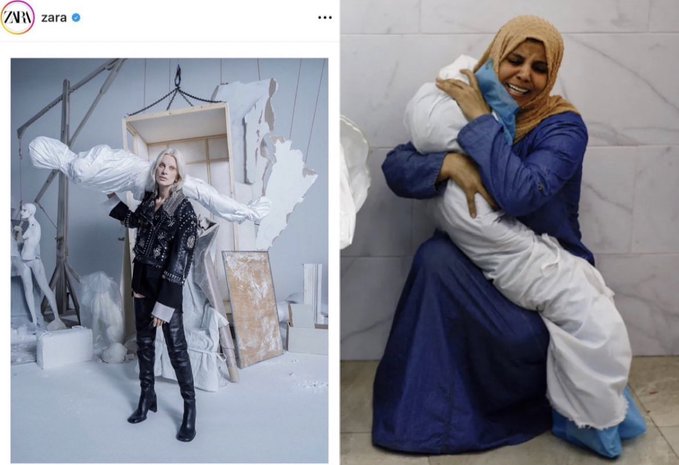Zara, the Spanish retail giant, found itself amidst a major controversy following the release of its recent advertising campaign. The campaign’s images, including rubble, wrapped figures, and a map reminiscent of Palestine, have ignited a firestorm of criticism, drawing striking parallels to the devastating situation in Gaza. This has lead to global movement asking people to Boycott Zara.
If you are asking why #BoycottZara ??
— 𝐒𝐡𝐚𝐧𝐞 𝐀𝐬𝐢𝐦 𝐑𝐢𝐚𝐳 𝐓𝐦 (@SyedKTweet) December 11, 2023
This is why..
Such shameful act.#CEASEFIRE_NOW pic.twitter.com/dmsUM8u9Ee
The Provocative Campaign
Zara unveiled a campaign dubbed ‘The Jacket,’ presenting model Kristen McMenamy alongside mannequins covered in white cloth and plastic. The retailer defended the campaign as a deliberate artistic choice aimed at showcasing the garment’s versatility. However, the images featured unsettling elements resembling scenes of destruction, which sparked intense backlash and widespread condemnation.
Outcry and Calls for Boycott
Public outrage quickly surged across various social media platforms, with individuals expressing deep dismay and anger over what they saw as Zara’s insensitivity to the ongoing strife in Gaza. Artists, activists, and consumers voiced their condemnation, labelling the campaign as tasteless and disrespectful. The outrage culminated in calls for a boycott of Zara products, citing the perceived exploitation of a humanitarian crisis for commercial gain.

Echoing Disapproval
A plethora of reactions flooded social media, amplifying the fervour against Zara’s campaign. Numerous users posted images and comments denouncing the campaign’s resemblance to the tragic scenes in Gaza, labelling it as marketing over genocide. Palestinian artist Hazem Harb publicly expressed disappointment, urging consumers to boycott Zara in protest against what he described as complicity in using death and destruction as a backdrop for fashion.
Also Read: In A Viral Video, M S Dhoni Surprises A Fan By Attending His Birthday Party
Zara’s Previous Controversy and Financial Ramifications
This isn’t the first instance of Zara facing controversy regarding its stance on Palestine. A prior incident involving anti-Palestinian comments from the company’s head designer resulted in significant financial losses for Zara’s branches in occupied territories due to a widespread boycott.
"Maybe if your people were educated then they wouldn’t blow up the hospitals and schools that Israel helped to pay for in Gaza"
— muslim daily (@muslimdaily_) December 9, 2023
– Vanessa Perilman, Zara head designer pic.twitter.com/3IfVa8Iz20
A Wider Boycott Movement
Zara’s recent controversy is part of a broader trend where multinational brands facing accusations of links to contentious geopolitical issues encounter boycott campaigns. Notably, several other brands, including McDonald’s, KFC, Starbucks, and H&M, have also come under fire and faced calls for boycotts due to their perceived associations or support for certain geopolitical positions.
Zara’s Response
Despite the escalating public outcry, the brand has remained silent, offering no official statement addressing the controversy. However, reports indicate that some campaign images have been removed from Zara’s website and social media platforms.
The storm surrounding Zara’s campaign highlights the intricate interplay between commerce, geopolitics, and social consciousness. It emphasises the considerable influence of public perception on multinational corporations and underscores the growing consumer demand for ethical accountability in corporate practices.


